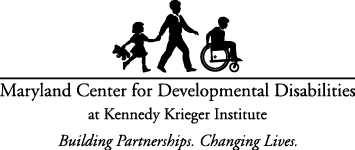MCDD Resources and a Toolkit During the COVID-19 Pandemic
June 8, 2020

|
| Download |
|
|
Due to the COVID-19 pandemic, many things are uncertain. The Maryland Center for Developmental Disabilities (MCDD) created guidance documents for individuals with intellectual, developmental, and other disabilities and their families to help navigate these challenging times. The MCDD, Maryland's University Center for Excellence in Developmental Disabilities (UCEED), is located on the campus of Kennedy Krieger Institute, a pediatric hospital serving individuals with disabilities and their families.
The MCDD developed guidance documents which are especially relevant in navigating the challenging times of the COVID-19 pandemic, but will be relevant even after the pandemic ends. First, MCDD staff created the "Kennedy Krieger Institute Advance Directive Toolkit."This toolkit is intended to help Kennedy Krieger faculty, staff, trainees, patients, students, and their families navigate future planning and medical decision-making. Adults may use an advance directive to designate who has the power to make decisions on their behalf, what decisions others may make for them, and the scope of those decisions. Having an advance directive in place is particularly important in light of the COVID-19 pandemic. The toolkit was disseminated to Kennedy Krieger faculty, staff, and trainees via email to review and share with the patients and students. Additionally, the toolkit is available to a broader audience on the MCDD's website. Next, MCDD staff created "The 4S to Supporting Self and Others."
This document was developed to help individuals with disabilities and their families navigate the new normal of quarantining and social-distancing that results from the COVID-19 pandemic. The document includes four tips for individuals with disabilities to help support themselves and others during this time, including: seeking help and support, staying connected, setting news boundaries for good mental health, and sharing the facts. The document also includes a variety of useful resources for providers and community members. It was disseminated through email to our networks, and it is currently available on the MCDD's website. Finally, MCDD staff created a digital flyer titled "Types of Discrimination and Discrimination Remedies." This digital flyer covers various ways individuals can experience discrimination, including disability discrimination, employment discrimination, and healthcare discrimination. The document also provides numerous methods for resolving discrimination issues, including contact information and ways to file complaints if an individual experiences discrimination. It was disseminated through email to our networks and is currently available on the MCDD's website. The MCDD is proud to be a resource for the disability community, particularly during this unprecedented time. In addition to these special projects, the MCDD is continuing its work to support individuals with disabilities and their families. For more information about these resources, please contact (443) 923-9555.







